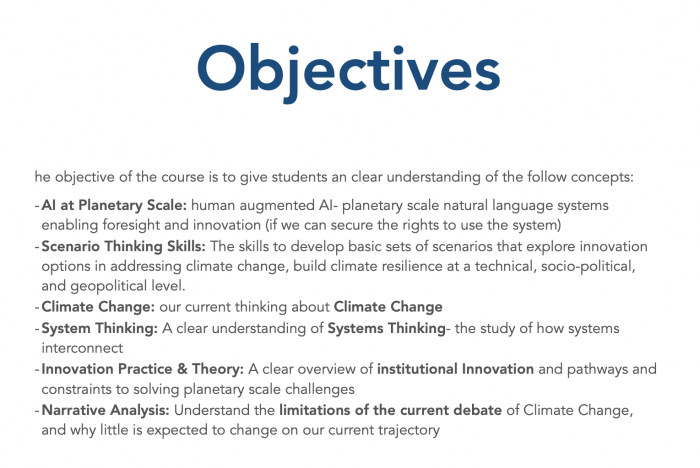RSM MBA 2021 Scenarios
The new limits (and opportunities) to Growth - Club of Rome 50 year Update
Introduction
Two millennia ago Cicero wrote “One cannot fight the weather”- we will have to. The Club of Rome: Limits to Growth Study published in 1972 with 30 million copies sold together with the Rachel Carson’s Silent Spring kickstarted the environmental movement. In 2022 the Club of Rome will publish a follow up study looking ahead another 50 years. To compliment the study a select group of RSM students will work on building innovation scenarios to add to the 50 year update of the Limits to Growth study work being done. All of the concepts discussed in the course (see the objectives section) are deeply complex and the design of the course is to give students overview of the topics to understand how these concepts interrelate to each other, not to become a systems thinking, narrative analysis or climate change expert. This is the art of building scenarios is understanding of how things connect, and how things could connect in novel and interesting ways.
As a result the students will build insights for the next 50 years that will guide their business and ethical choices over this uniquely challenging period of human history and at the same time contribute to one of the most important studies being done in world.
The type of questions we shall be asking: What does the business landscape look like in a world changed by climate? What does resilience look like when it is not an adjunct to the CSR department but a business critical capability? How will our institutions be transformed by a structurally different level of uncertainty? Climate change is already here, and its cascade of effects is set to dominate business landscape this Century- we better get good at change- how? The UN experts 200 million climate refugees in less than 30 years- the EU was deeply challenged by 1.5M Syrian refugees- are we expecting a breakup of a number of central institutions as countries (and cities) go it alone? Biden’s energy plan plans to half CO2 emissions in the next 8.5 years- what does that mean to energy/business landscape? Is there a breakthrough in Fusion expected in the near term, does it matter? What will be the effects of China as a global power, with a climate progressive stance across the 64 countries of the Belt and Road Initiative, or not as it structurally funds and builds coal fired plants across the BRI? etc.
Objectives & LEARNING OUTCOMES
The 1972 Limits to Growth study was criticized for not giving enough credence to the innovative capacity of institutions. We plan to address this criticism by compliment ting the existing work with an innovation column. The students will develop scenarios of innovation pathways to a resilient future. Innovation here is understood in its broadest terms (technical, socio-economic, political, etc.)- 50 years is a long time! The objective of the course is to give students an clear understanding of the follow concepts:
- AI at Planetary Scale: human augmented AI- planetary scale natural language systems enabling foresight and innovation (if we can secure the rights to use the system)
- Scenario Thinking Skills: The skills to develop basic sets of scenarios that explore innovation options in addressing climate change, build climate resilience at a technical, socio-political, and geopolitical level.
- Climate Change: our current thinking about Climate Change
- System Thinking: A clear understanding of Systems Thinking- the study of how systems interconnect
- Innovation Practice & Theory: A clear overview of institutional Innovation and pathways and constraints to solving planetary scale challenges
- Narrative Analysis: Understand the limitations of the current debate of Climate Change, and why little is expected to change on our current trajectory
Scenario Groups
Global Energy System- How we power things
Global Equity/ Voice of Women
Regenerative Agriculture- Natural System Services
Industrial System- How we make things
